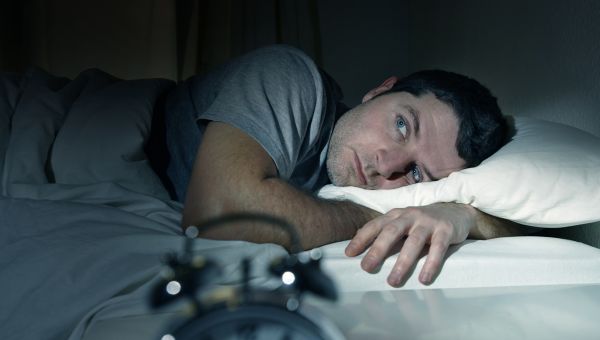7 health pitfalls for night shift workers and how to avoid them
Constant caffeine, skipped workouts and other perils of the late-night worker.

As a night shift worker, you’re used to a schedule that’s the reverse of the rest of the working world. But working the night shift isn’t just a matter of being awake at different hours than most people—this shift can be isolating, and also carries with it serious health implications, including higher chances of obesity and chronic diseases such as heart disease, diabetes… Show More
As a night shift worker, you’re used to a schedule that’s the reverse of the rest of the working world. But working the night shift isn’t just a matter of being awake at different hours than most people—this shift can be isolating, and also carries with it serious health implications, including higher chances of obesity and chronic diseases such as heart disease, diabetes and even cancer. Typically, night shift work is often not a choice—whether the job demands it, or because it suits your life, most nurses cannot easily switch to a different schedule. Here are the seven common pitfalls of night shift nurses—plus, everything you need to know to avoid these traps.
Show Less
Propping Yourself Up on Energy Drinks and Sugar
Caffeinated beverages and sugar-heavy treats are a tempting solution to mid-shift drowsiness. Starting your shift with a cup of coffee is one thing, but continuously chugging a grande Starbucks beverage will do you no favors when it comes time to wind down at the end of your shift. And while sugar-… Show More
Caffeinated beverages and sugar-heavy treats are a tempting solution to mid-shift drowsiness. Starting your shift with a cup of coffee is one thing, but continuously chugging a grande Starbucks beverage will do you no favors when it comes time to wind down at the end of your shift. And while sugar-filled snacks provide a surge of energy, it’s quickly followed by a dip (which, of course, only motivates you to have more sugar, creating an unhealthy cycle). Stick to just a cup or two of coffee or other caffeinated beverages, and aim to have it early in your shift, to avoid disrupted sleep.
Show Less
Not Accommodating Your Daytime Sleep Needs
Throughout your shift, you felt sleepy. But when you arrive at home, where finally—finally!—you can rest, all of a sudden you may find yourself feeling jittery and unable to close your eyes. Build in a wind-down routine for after your shift ends instead of going straight to bed. You might watch… Show More
Throughout your shift, you felt sleepy. But when you arrive at home, where finally—finally!—you can rest, all of a sudden you may find yourself feeling jittery and unable to close your eyes. Build in a wind-down routine for after your shift ends instead of going straight to bed. You might watch some TV, prep meals for the next day, read a book, take a bath or drink a cup of decaf tea. Make sure your bedroom has blackout shades or invest in an eye mask so that your room feels dark, even with sunlight outside. Use a white noise machine to cover up household sounds and turn off noisemakers such as phones, doorbells, and alarms that could go off during your sleep.
Show Less
Grabbing Unhealthy Food On-the-Go
The world, sadly, does not cater to people working the night shift. That store with healthy pre-made meals that the day shift nurses always talk about? Closed by the time you clock-in at work. It’s easy to find an open bar during a night shift, but harder to find an open salad bar. Plan ahead so… Show More
The world, sadly, does not cater to people working the night shift. That store with healthy pre-made meals that the day shift nurses always talk about? Closed by the time you clock-in at work. It’s easy to find an open bar during a night shift, but harder to find an open salad bar. Plan ahead so that you can avoid unhealthy options and vending machine meals. Try prepping meals on a day off, and bringing snacks from home. This can help you avoid fattening, unhealthy options. With night shift nurses at increased risk for obesity and weight-related conditions, such as diabetes and heart disease, a healthy diet is an important preventative measure.
Show Less
Flipping Your Schedule on Days Off
It’s a mistake to think that you can work the night shift for a few days in a row, and then smoothly transition to a normal schedule. Trying to “catch up” doesn’t work either, according to the National Sleep Foundation. The better strategy is to stick to the same sleeping and eating schedule on… Show More
It’s a mistake to think that you can work the night shift for a few days in a row, and then smoothly transition to a normal schedule. Trying to “catch up” doesn’t work either, according to the National Sleep Foundation. The better strategy is to stick to the same sleeping and eating schedule on your days on as on your days off as much as possible. Often, forces outside of your control dictate your schedule, but do your best to avoid a week working day shifts followed by another week on the night shifts—consistency is best for your health and well-being.
Show Less
No Plan for Downtime During Shifts
Night shifts may have more lulls than a day shift—there are just less people around and patients are resting, which can mean less work is generated. If you don’t have a plan for this opportunity, it’s easy to default to using food as entertainment, eating mindlessly and sitting for long periods.… Show More
Night shifts may have more lulls than a day shift—there are just less people around and patients are resting, which can mean less work is generated. If you don’t have a plan for this opportunity, it’s easy to default to using food as entertainment, eating mindlessly and sitting for long periods. Instead, if you work with the same nurses routinely, form friendships and connections. If it’s not your meal, rest or bathroom break, aim to tackle constructive work during downtime from updating certifications with required online courses to tackling paperwork.
Show Less
Forgoing Exercise
Not only is a lack of exercise poor for your overall health, but exercising also helps increase your alertness while you're at work. If you have long breaks, consider using them to do some exercise—you can go for a 20-minute walk, do some stretches, use apps on your phone to do 7-minute workouts or… Show More
Not only is a lack of exercise poor for your overall health, but exercising also helps increase your alertness while you're at work. If you have long breaks, consider using them to do some exercise—you can go for a 20-minute walk, do some stretches, use apps on your phone to do 7-minute workouts or more. At work, look for opportunities to incorporate movement. Rather than scooting your chair along the floor to the filing cabinets, get up and walk. Take the stairs instead of the elevator. Walk the long way to the cafeteria. Consider using a pedometer or electronic health tracker to track steps and set a goal for each shift.
Show Less
Taking Care of Patients’ Health—And Not Your Own
Nurses are caretakers. But too often, as the Online Journal of Issues in Nursing reports, nurses fail to take care of themselves. The risks from this are huge—nurses overall have a higher propensity to many diseases, and working the night shift only increases health problems, from cancer to… Show More
Nurses are caretakers. But too often, as the Online Journal of Issues in Nursing reports, nurses fail to take care of themselves. The risks from this are huge—nurses overall have a higher propensity to many diseases, and working the night shift only increases health problems, from cancer to insomnia, heart disease to loneliness, weight gain to diabetes. Self care means taking time for yourself, going for your own health care appointments, eating healthily, exercising regularly, and maintaining the social connections with friends and family that are so vital for your well being. Doing all of this will make you happier and healthier—and also help you provide better patient care.
Show LessMore On


video

article

slideshow


video


video
